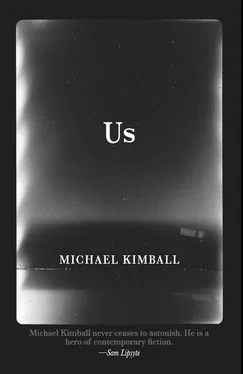My grandfather cared for her so much and I keep thinking about what he must have been feeling then. I keep thinking about how he had to learn how to do those things for her and around the house. He had never done the laundry or the dishes or any other kind of cleaning around the house. He had to learn how to cook. He started with soup and with toast and with other food that was easy for him to make and easy for her to eat.
He learned about the laundry — what clothes could be washed together, when to use bleach, and how long things needed to stay inside the dryer — but worried about being away from her when he had to go downstairs to put the laundry in or take it out. He knew that it would take him so long to get back up to her upstairs in the living room, even if he could hear her ringing the metal ringer that he had left for her next to her bed. He wanted to be able to sit there with her so that he would be ready for her when she needed him.
But there wasn’t anything that he could do that seemed to make her feel any better or even better enough to want to stay alive. He cared for her so much, but he couldn’t make the physical pain leave her body.
They both knew that she wasn’t ever going to get up out of that living room bed again. She stopped eating any more food and only drank water and ate ice chips. She stopped taking her pills and died early one morning a few days later, a few hours before she was supposed to wake up.
My grandfather stayed with her for a few hours before he called the doctor and the funeral home. My grandfather knew that was going to be the last time that he was going to be alone with her. But he was also waiting until she had been dead long enough so that she couldn’t be revived. My grandmother didn’t want to be only that much alive, even though my grandfather wanted her to be alive for as long as she could be.
How Love Can Accumulate Between Two People
My Grandmother Oliver wrote in her diaries throughout most of her life and they were passed on to me after she died. Other people inherited other things from her. People from her church took her clothes and her shoes. People from her quilting group picked up the boxes of scrap material that were never used, a few unfinished quilts, and packets of needles and spools of thread. My mother got my grandmother’s antique sewing machine. My sister got most of her real jewelry and her costume jewelry too.
There were certain holiday dishes that my mother and my sister and my brother’s wife each wanted — a series of plates with winter scenes on them, a group of bowls made out of colored glass, some ornate serving dishes that were just used on holidays and birthdays. They split them up with each other, but they all seemed to feel some sense of loss in this. Those holiday dishes meant so much to each of them, maybe the idea or the feeling of a whole family being together, but each one of them only got some of them.
But the diaries were the only things that I wanted from her after she died. I wanted to know what my grandmother had thought about for her whole life. I wanted to know what she wrote about the births of her two daughters and her three grandchildren. I wanted to know what she wrote about her daughter’s scarlet fever from when she was little and her daughter’s cancer that she died from forty years after that.
I wanted to know what she wrote about her husband’s marriage proposal and about their years of marriage that they had together. I wanted to find out what she wrote about her husband’s years of heart problems and what she wrote about herself in her last years when her body started to fail and it became difficult for her to walk and to breathe.
But she didn’t write down anything about any of these things in her diaries besides that they happened — that my grandfather showed her an engagement ring and that she put it on her finger, that her daughters said their first words and said other cute things as they grew up, that her daughter Anita was sick with fever, that my grandfather went into the hospital for a heart valve operation, that her sister Billie had Alzheimer’s disease, that Anita was sick with cancer, that my grandfather was recovering, that he came home and continued to improve, that they went to Billie’s funeral, and that they went to Anita’s funeral.
There were hair clippings from each of her daughters from when they were babies and then little girls. There is also a little bit of peeled skin from my Aunt Anita, from the last months of her life, that is taped into one of the diary entries. But my grandmother never wrote anything down about being sad or tired or afraid. It was enough to go to the hospital and the doctor’s office with them and to take care of each of them when they came back home.
But even all these serious things made up only a small portion of her diary entries for her whole lifetime. Most of the daily entries only noted daily things — if she washed or ironed, who visited the house, who she went out to lunch with, if they ate at home or ate dinner out, the days that she went to the beauty parlor and the kind of hair-do that she got, the clothes and the quilts that she made and who she made them for.
She made and washed and ironed lots of clothes. She ate lunch with lots of different friends and most of her other meals with her family. She visited other cities and countries and hospitals and funeral homes. She knew a lot of people who died of heart attacks and of strokes. It snowed a lot in her life.
I found myself exasperated by her diaries and what I didn’t find there. But maybe nobody was ever supposed to read those diaries of hers. Maybe the diaries were just supposed to be for her while she was alive and not for anybody else after she died. But I still wanted to read something about my grandmother’s love for my grandfather or about her recognition of his great affection for her.
That was how I started to think about how love can accumulate between two people over and through two lifetimes. And that reminded me of how, whenever I went over to their house to visit them in the evening, they were always sitting down next to each other on the couch in their living room.
The Funeral Home that Had Been Somebody’s House
My preoccupation with the dying and the dead started with my Grandfather Kimball when I was fourteen and he was dead. He was the first person who had died in my life and it was the first time that I was going to a funeral. But my mother and my father didn’t tell me what to expect when we got out to the funeral home. I only remember that I was told that I had to go, that I had to look nice, and that looking nice meant that I had to comb my hair, wear a belt, and tuck my shirt in.
I got dressed up in my best clothes and the rest of my family did too. We all got into the family car and drove to a little town out in the country where my grandfather had lived. Nobody said anything on the drive out there, but the car windows were open and the driving wind was messing everybody’s hair up and making our good clothes seem worn out.
My father parked the family car in a gravel parking lot behind what I thought was somebody’s house. I realized later that it had been somebody’s house, but that it had become a funeral home. We got out of the family car, walked around to the front of the funeral home, walked up the front steps, opened a screen door, and walked into what must have been somebody’s living room and had become the front room of the funeral home.
The screen door closed behind us with a slap against the wood doorframe. The windows in that front room of the funeral home were all open and the wind was blowing through it, but it was still hot and smelled musty inside there.
My mother and my father stopped inside the screen door and my sister and I stopped behind them. My mother and my father were talking to somebody or somebody was talking to them. I don’t remember what they said, but I remember that I wasn’t included in the conversation and that I started looking around that front room.
Читать дальше












